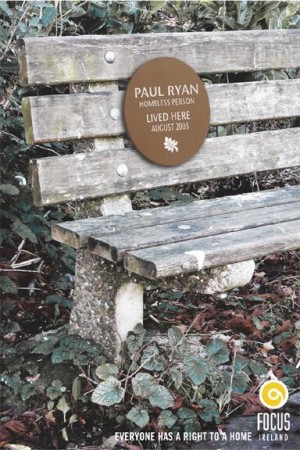
Still Waiting for Housing
The findings of the Local Authority Assessments of Social Housing Needs, carried out in March 2005, were released by the Department of the Environment, Heritage and Local Government in December 2005.

The findings of the Local Authority Assessments of Social Housing Needs, carried out in March 2005, were released by the Department of the Environment, Heritage and Local Government in December 2005.

The evaluation of existing plans and services for homeless people currently being undertaken by the independent review of 1 provides an opportunity to reflect on the progress that has been made in recent years in addressing homelessness in Dublin and to highlight the significant challenges that are still ahead if the aim of eliminating homelessness in the capital by 2010 is to be realised.

In spring 2004, Focus Ireland, the voluntary organisation dealing with homelessness, placed a series of poster advertisements around Dublin city. These were designed to look rather like the plaques which are put on buildings to indicate that a noted artist, political figure or other famous person once lived there.

Many readers will have heard of Niall Mellon, the Dublin developer who has taken on the task of providing houses for families in the South African township of Imizamo Yethu. Some years ago,

At the close of the 20th century, a mere five years ago, there was delight and optimism in planning and environmentally informed
circles that Ireland was for the first time ever about to have a hierarchically integrated system of interrelated plans covering the country and operating at every level. Preparation of the National Spatial Strategy was well advanced. The provided a statutory basis for the preparation and implementation of Regional Planning Guidelines. The Act also modernised the\’Development Plan\’ process and established procedures for making and implementing Local Area Plans. This new approach to planning was introduced against the continuing national partnership approach, most recently articulated in .

In April 2004, the All-Party Oireachtas Committee on the Constitution published its Ninth Progress Report.(1) The Report discusses whether the provisions of the Irish Constitution concerning property rights obstruct social justice and the common good in the area of land and housing, with regard to purchase, planning and infrastructural development. The opening lines of chapter… Read more »

Introduction The recommendations of the All-Party Oireachtas Committee on the Constitution on the right to private property and its relationship with the requirements of the greater social good, take on particular significance when seen in the context of Ireland’s recent unprecedented demand for housing and infrastructural development, arising from nearly a decade of high levels… Read more »

Introduction One of the most ideologically and economically sensitive elements in any state is the legal and constitutional regime governing the ownership of private property. The regulation, taxation and expropriation of property raise fundamental questions of justice, equity, the right to shelter, the balance between individual rights and the common good. All these matters are… Read more »

After many decades of neglect, the government is proposing a major reform of the law governing landlord-tenant relations in residential premises. The proposals are contained in the Residential Tenancies Bill 2003 (hereafter referred to as ‘the bill’)(i). As is well known in informed circles, but less so to the general public, the Irish tenant’s lack… Read more »
Working Notes is a journal published by the Jesuit Centre for Faith and Justice. The journal focuses on social, economic and theological analysis of Irish society. It has been produced since 1987.